Being nice, knowledgeable key to giving patients a good experience
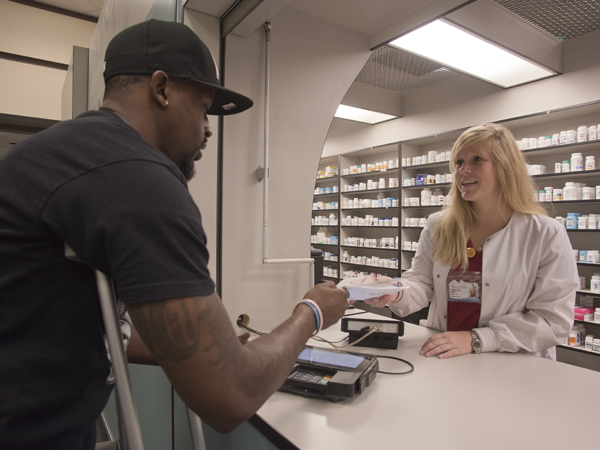
It's really not enough for a University of Mississippi Medical Center clinic receptionist, a pharmacy technician or an oncology nurse to be adept at the details of their job, or to have the training it requires.
Employees who in one way or another intersect with outpatients must be more than that. They need to conduct themselves professionally at all times. And, they need to be nice and to show they care.
“This extends from live interaction with a patient to phone interaction,” said Elizabeth Beasley, director of ambulatory operations at UMMC's Grants Ferry clinic. She's leading a campus work group that's changing culture by training the 1,800 established, non-provider ambulatory workers in giving patients the best experience possible.
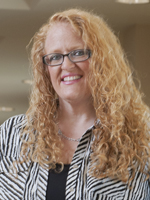
Beasley
“There's zero tolerance for rudeness,” Beasley said. “We're trying to drive home that every patient deserves a 'Wow!' experience, and that we want to go above and beyond every time.”
Her work group is one of six under the umbrella of Chief Medical Officer Dr. Michael Henderson's office. Its members are scrutinizing answers to surveys that are regularly mailed to outpatients following a recent visit to a UMMC provider.
“This is a pilot program in our ambulatory space for the broader training we will give to all employees,” said Henderson. “As it shows success going forward, it will be important that we share that with all employees who will be trained on how to interact with patients and families and provide a good patient experience.”
Patient experience surveys ask patients, or in some cases, their families, about their overall experience at their appointment. The surveys focus on matters that patients themselves say are important to them and for which patients are the best or only source of information.
Some examples of questions being asked pertaining to a particular visit: Did your provider show respect for what you had to say and explain things in a way that was easy to understand? Did you see this provider within 15 minutes of your appointment time? Did clerks and receptionists treat you with courtesy and respect?
A patient experience survey shouldn't be confused with a “customer satisfaction survey” that focuses on amenities, not a patient's experience with critical aspects of health care.
Surveying patients is an ongoing initiative, but “when we looked at the ambulatory responses, we saw that our lowest percentage ranking was the quality of office and clinic staff,” Beasley said. “We decided to start with the hardest one, because it would be the hardest to fix.”
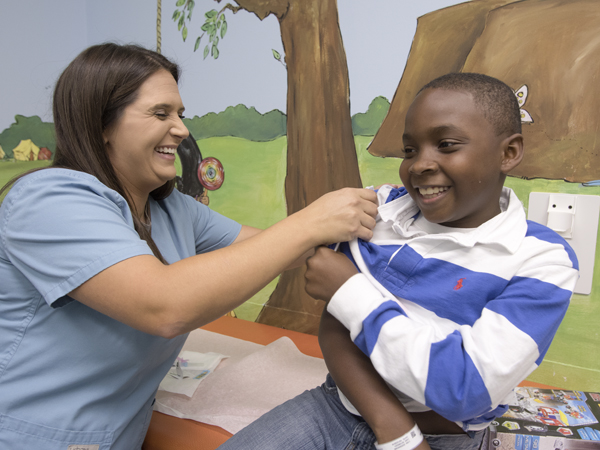
Christian Quarles, an oncology nurse at the Children's Cancer Clinic, gets patient Derrick James, 9, of Byram ready for his flu shot.
Over a 92-week period that began in August, affected employees will receive four hours of mandatory classroom training and another two hours of online training. New employees will also take part in the training, and will automatically receive an assignment through Healthstream if they are on an ambulatory accounting unit. They'll have one month to complete the classroom portion.
“It focuses on every title other than the provider in the ambulatory world,” Beasley said.
Classroom instruction by employee trainers is fun and interactive, Beasley said. “We'll talk about the culture at UMMC and why they choose to work here and in the health-care industry. We'll talk about what their stresses are, and how that translates into how they treat patients.
“We have role playing and videos on how patient experience should go and not go,” she said. “We talk about the mindset of some state employees, which is that 'I'd do my job better if everybody else did their job better.' That's not an excuse. You have a personal obligation to report to UMMC when our patients are treated badly. Take it upon yourself as if you or a family member were going through the same thing.”
Ferriss Brown, a hospital administrative resident, is among the trainers. “People assume that it's the expectation to provide good customer service, but that may not always be the case at UMMC,” he said. “You can say generically, 'Let's be nice and friendly,' but this training really helps you understand what that means in the patient care arena.
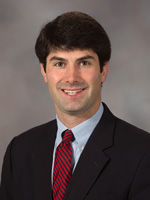
Brown
“Health care is a competitive industry. Patients have a choice on where they can get their care,” Brown said. “We want employees to put their best face out there for their patients and the community so that we can be a provider of choice.”
Crystal Snyder, a physician scheduler for reproductive, endocrinology and infertility at UMMC's Mirror Lake clinic, said her recent training actually made her a bit emotional.
“There was a part of the video we saw that showed you never know what someone else is going through,” Snyder said, referring to the demeanor of patients being scheduled for visits. “You know that, but you need to be reminded. I think we all boo-hooed a little when we saw that part of the video. Try not to let their mood change your mood.”
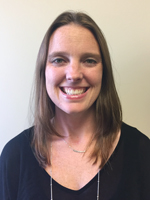
Snyder
Snyder said she's had a habit of immediately responding “OK” to a patient when they first ask for an appointment. “Instead, I should say, 'Absolutely! I'd like to help you with that,''' Snyder said. “I thought the training was great.”
It's important to build up the volume of surveys received to get the best information on outpatients' experiences, said Dr. Thomas Prewitt, vice chair for quality and safety for the Department of Surgery and clinical lead for quality improvement in the office of the CMO.
“If the culture is not right, then we won't be successful in what our jobs should really be, which is taking care of people,” Prewitt said. “You want patients to trust you and to enjoy being your patient.”
He has high praise for the work group that formulated the training. “They have fire in the belly to make this work well, and they are focused on what's best for the patient,” he said. “It's not easy, but I'm proud of what they've done. I'm really excited to see what happens with this training.”
Members of the work group in addition to Beasley are Melody Longino, the group facilitator and the Medical Center's performance improvement coordinator; Dr. Scott Gibson, assistant professor of geriatrics; Dr. Simeen Pasha, assistant professor of endocrinology; Stacy Martin, associate director of ambulatory access management; LaSonia Jones, supervisor of business and clinic operations for University Physicians' Internal Medicine- Cardiology Administration; and Brittany Groover, a licensed practical nurse.
“Even if it's the worst day of their life, we want patients to leave saying that at least the staff was nice,” Beasley said. “We want them to feel like they've gotten a big hug.”


